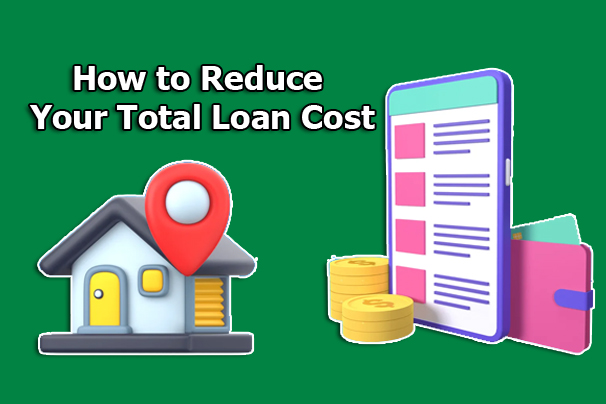For any reason, you should be aware of the total cost of the loan and try to reduce it as low as possible if you are considering taking one out. Even while a loan might help you pay for a large expense, such as a wedding, a vehicle, or a house, you will probably pay back more than you originally borrowed due to fees and interest.

However, you may be able to reduce the total cost of your loan with a little preparation and research. Whether you’re borrowing money for a home, automobile, or school, this article will outline some methods to assist you in reducing the total cost of your loan.
How to Reduce Your Total Loan Cost
This article provides nine effective strategies to reduce your total loan cost, focusing on minimizing interest payments and fees and maximizing savings over the loan’s life. These strategies can help individuals and businesses achieve their financial goals while minimizing long-term financial impact.
Improve your credit score
Credit scores are examined by lenders in order to assess loan applications and set interest rates. Different rates are offered for varying credit scores through tiered pricing; higher scores translate into better loan offers and cheaper interest rates. Moreover, consult a lender who performs a soft inquiry without lowering your credit score to find out your current credit status. Maintaining low credit card balances and paying bills on time are essential for long-term credit enhancement.
Shop around
The total cost of your loan is mostly determined by interest rates. Over the course of the loan, even a little variation in interest rates might add up to significant savings. Therefore, before taking out a loan, it’s critical to shop around and evaluate the interest rates provided by various lenders. To learn more about your alternatives, think about contacting banks, credit unions, and internet lenders. Furthermore, online comparison tools are another useful tool for expediting the process and locating the best deals.
Borrow less
Determine the precise amount of money you need before taking out a loan, and just as much as necessary. Reduce the amount of your debt, if you can. The origination fee, or the amount the lender charges for making the loan, may go down if you borrow less money. A percentage of the loan amount is usually charged as the origination fee.
Set up autopay
By enabling autopay, or monthly bill payment, you may also be able to reduce the total cost of your loan. If you accept to have your loan installments automatically deducted, your interest may be lowered, depending on the lender. Additionally, by guaranteeing that you never miss a payment, autopay can help you avoid fines and even harm to your credit score even if you don’t receive a discount.
Make an extra payment
To reduce loan costs, make extra or part payments, shorten repayment periods, and save on interest charges. Use tax refunds or bonuses for lump-sum payments, as even small additional payments can significantly impact the loan’s principal.
Refinancing your loan
One further way to reduce the cost of your loan is by refinancing. You may be able to obtain a lower interest rate by refinancing, which will cut both the total cost of the loan and your monthly payments. Moreover, refinancing may include extra fees or costs that should be taken into account.
Choose a shorter loan term
Shorter loan terms offer lower interest rates and less total interest. Generally, the following includes a 15-year mortgage, short auto loans, and personal loans. You can consider 15-year mortgages rather than a 30-year mortgage. Also, you can choose a 3-year car loan instead of a 5-year short auto.
Add co-borrower
If your co-borrower has excellent credit, include them on your loan application to potentially receive better terms. The obligation to repay the loan is shared by co-borrowers. Having a qualifying co-applicant at Achieve may result in a personal loan interest rate reduction, saving you money on interest over the course of the loan. Additionally, a co-signer may enable you to obtain a loan for which you would not otherwise be eligible.
Avoid unnecessary fees
Examine terms and conditions before taking out a loan to learn about origination, prepayment, late payment, and processing costs. Seek out lenders who provide low costs or make arrangements for exemptions. Pay on time to keep your credit intact and prevent late fines.
Factors That Determine Your Total Loan Cost
Your loan fees may be affected by the following factors:
Interest rate
Your lender will often add interest to the amount you borrow when you take out a loan. The annual percentage rate (APR), which includes fees and interest, is another way to portray the interest rate in addition to just itself.
Credit score
Lenders usually use your credit score when you apply for a loan in order to assess your repayment capacity and set an interest rate. Reduced risk to the lender is indicated by higher ratings.
Income and debt
The lender will take into account your income and the percentage of it that you pay toward debt each month, particularly for significant loans like a mortgage.
Loan terms
The length of the loan, fees, and other details may be included, depending on the lender and kind of loan.
Each of these factors contributes to the total cost of your loan. However, that does not imply that you have no say over the final cost of borrowing money. Furthermore, take into consideration the following actions to reduce your total loan cost. It’s essential to comprehend loan conditions if you want to finance big purchases. Moreover, maintaining credit helps identify possible refinancing possibilities and the cost of borrowing. Lastly, it is possible to reduce the total loan cost if you keep up with borrowing fees.



